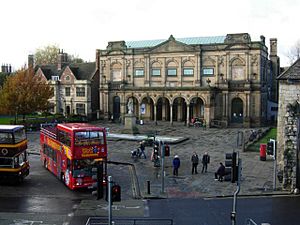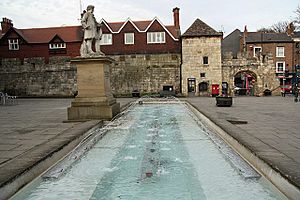Exhibition Square facts for kids
Exhibition Square is an open area in the heart of York, England. It's a popular meeting place and a starting point for many tours. This square has a rich history, connecting to ancient Roman times and important events in York's past.
Contents
A Look Back in Time
From Roman Days to a Nursery
The land where Exhibition Square now stands was just outside the walls of Roman York, an ancient city. It was also outside the medieval city walls, but inside the grounds of a large old building called St Mary's Abbey.
By the 1800s, this area was used as a plant nursery by a man named Mr. Bearpark. In 1833, a part of the city walls was taken down. This made way for a new street called St Leonard's Place.
Creating the Square
In 1866, a big Art and Industrial Exhibition was held nearby on Bootham. People liked it so much that they decided to have another one in 1876. To make space, Mr. Bearpark's nursery was rented. An old house and a pub called the Bird in Hand were also taken down.
In 1879, Exhibition Square was built on the south-eastern part of this cleared land. A large exhibition hall was built to its north-west. Part of this hall is still standing today and is now the York Art Gallery.
Today's Use
Today, Exhibition Square is a very busy place. It's the main spot where bus tours of York begin. Walking tours, led by the Association of Voluntary Guides to the City of York, also start here. It's a great place to meet up before exploring the city.
What You'll See There
Location and Nearby Buildings
Exhibition Square is located west of the northern end of St Leonard's Place, where it meets Bootham. Right across from the square is Bootham Bar, a famous old gate in the city walls.
On the north-eastern side, you can see part of the old abbey's boundary wall. This includes Bootham Tower and Queen Margaret's Arch. This arch leads to the junction of Bootham and Gillygate.
The York Art Gallery is on the north-western side of the square. On the south-western side is King's Manor, another historic building. The railings in front of King's Manor are quite old. They were first built in 1726 for York Mansion House, a grand building in the city.
Statues and Features
In 1911, a statue of a famous artist named William Etty was placed in the middle of the square. It was designed by G. W. Milburn.
In 1971, the square was made into a pedestrian-only area, meaning cars are not allowed. The York Civic Trust then added a fountain in front of William Etty's statue. This makes the square a pleasant place for people to walk and relax.



